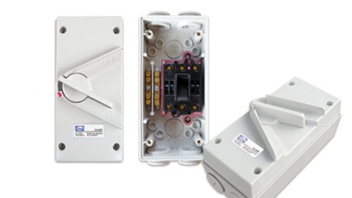In today's increasingly electrified world, a waterproof isolator has become a critical component in electrical installations, especially for outdoor applications. These specialized devices serve as isolation switches designed specifically to withstand harsh environments while maintaining operational reliability. Whether for industrial complexes, marine applications, or residential outdoor installations, waterproof isolators offer unique benefits that conventional isolators cannot match.

Waterproof isolators provide exceptional protection against water penetration, typically rated at IP65 or IP67 standards:
IP65 Rating: Offers complete protection against dust ingress and low-pressure water jets
IP67 Rating: Guarantees protection against temporary immersion (up to 1 meter for 30 minutes)
The advanced sealing technology prevents moisture accumulation inside the enclosure, which significantly reduces corrosion risks and ensures consistent electrical performance even during heavy rainfall or flooding conditions.
These isolators incorporate multiple safety enhancements:
Double insulation barriers prevent accidental contact with live components
Secure locking mechanisms ensure isolation can't be accidentally overturned
Visible isolation gaps provide visual confirmation of circuit disconnection
Such features make them particularly suitable for applications requiring compliance with strict safety regulations.
Modern waterproof isolators utilize:
Stainless steel enclosures for superior corrosion resistance
UV-resistant polymer components preventing degradation from sunlight exposure
Marine-grade materials for coastal applications where saltwater corrosion is a concern
These material choices extend service life significantly compared to standard isolators in outdoor installations.
Unlike conventional isolators, waterproof models are engineered to function reliably across extreme temperature variations:
Cold temperature performance: Specially lubricated mechanisms prevent freezing
Heat tolerance: Thermal-resistant materials prevent deformation
Consistent switching capability maintained across entire temperature range
This makes them ideal for installations subject to seasonal temperature extremes.
Waterproof isolators deliver operational efficiencies:
Sealed designs minimize dirt and debris accumulation
Self-cleaning contacts reduce maintenance frequency
Modular designs enable quick component replacement
Clear visual indicators simplify troubleshooting
These features contribute to lower total cost of ownership through reduced maintenance requirements.
The adaptability of waterproof isolators extends to various environments:
Industrial: Manufacturing plants, chemical processing facilities
Marine: Shipboard systems, offshore platforms, dockside installations
Renewable Energy: Solar farms, wind turbine installations
Infrastructure: Street lighting, traffic control systems
Construction: Temporary site power distribution
Waterproof isolators meet rigorous certification requirements:
IEC 60947 standards for low-voltage switchgear
UL approvals for North American markets
ATEX certification for hazardous environments
CE marking compliant with European directives
This certification portfolio ensures global acceptance and acceptance by regulatory bodies.
Construction industry: As an isolation layer between the waterproof layer and the rigid protective layer, it can prevent thermal expansion and contraction from damaging the waterproof layer.
Solar industry: Used for DC isolation of photovoltaic arrays, supporting on-load disconnection and safe maintenance.
Industrial and electronic fields: As a waterproof isolator, it ensures reliable connection in harsh environments.
Waterproof isolators combine safety, durability, and adaptability, making them ideal for critical applications where moisture, dust, or harsh climates threaten electrical systems.
GET A QUOTE